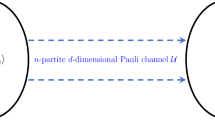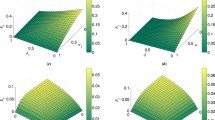Abstract.
We study the stability under quantum noise effects of the quantum privacy amplification protocol for the purification of entanglement in quantum cryptography. We assume that the E91 protocol is used by two communicating parties (Alice and Bob) and that the eavesdropper Eve uses the isotropic Bužek-Hillery quantum copying machine to extract information. Entanglement purification is then operated by Alice and Bob by means of the quantum privacy amplification protocol and we present a systematic numerical study of the impact of all possible single-qubit noise channels on this protocol. We find that both the qualitative behavior of the fidelity of the purified state as a function of the number of purification steps and the maximum level of noise that can be tolerated by the protocol strongly depend on the specific noise channel. These results provide valuable information for experimental implementations of the quantum privacy amplification protocol.
Similar content being viewed by others
References
A.K. Ekert, Phys. Rev. Lett. 67, 661 (1991)
C.H. Bennett, G. Brassard, S. Popescu, B. Schumacher, J.A. Smolin, W.K. Wootters, Phys. Rev. Lett. 76, 722 (1996)
C.H. Bennett, D.P. DiVincenzo, J.A. Smolin, W.K. Wootters, Phys. Rev. A 54, 3824 (1996)
D. Deutsch, A. Ekert, R. Jozsa, C. Macchiavello, S. Popescu, A. Sanpera, Phys. Rev. Lett. 77, 2818 (1996)
H. Aschauer, H.J. Briegel, Phys. Rev. A 66, 032302 (2002)
V. Bužek, M. Hillery, Phys. Rev. A 54, 1844 (1996); e-print arXiv:quant-ph/9801009
C. Macchiavello, Phys. Lett. A 246, 385 (1998)
See, e.g., M.A. Nielsen, I.L. Chuang, Quantum computation and quantum information (Cambridge University Press, Cambridge, 2000), Ch. 8
See, e.g., G. Benenti, G. Casati, G. Strini, Principles of Quantum Computation and Information, Vol. 1: Basic Concepts (World Scientific, Singapore, 2004), p. 110
We have also developed an alternative numerical technique, in which 2n imperfect EPR pairs are considered at the beginning, to obtain, after n steps and when the QPA algorithm is successful (coinciding outcomes for Alice and Bob's measurements), a single purified EPR pair. This numerical approach gives the same results as the simpler four-qubit mapping when the action of quantum noise is identical for each pair of EPR states. However, it has the advantage that more general situations can be treated, for instance the noise strength can depend on the considered pair of EPR states
We note that in the case of strong noise it is also possible that the fidelity degrades when the QPA algorithm is iterated
Author information
Authors and Affiliations
Corresponding author
Rights and permissions
About this article
Cite this article
Benenti, G., Felloni, S. & Strini, G. Effects of single-qubit quantum noise on entanglement purification. Eur. Phys. J. D 38, 389–396 (2006). https://doi.org/10.1140/epjd/e2006-00006-6
Received:
Published:
Issue Date:
DOI: https://doi.org/10.1140/epjd/e2006-00006-6




